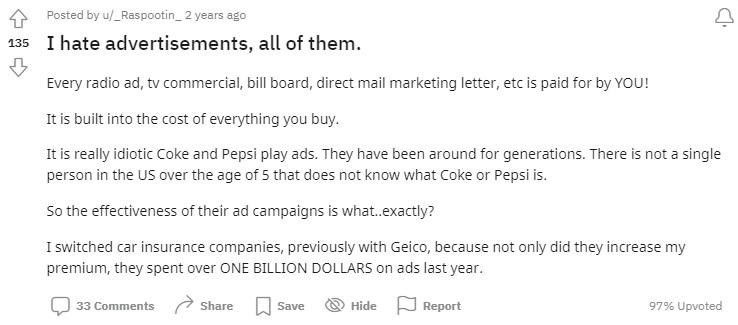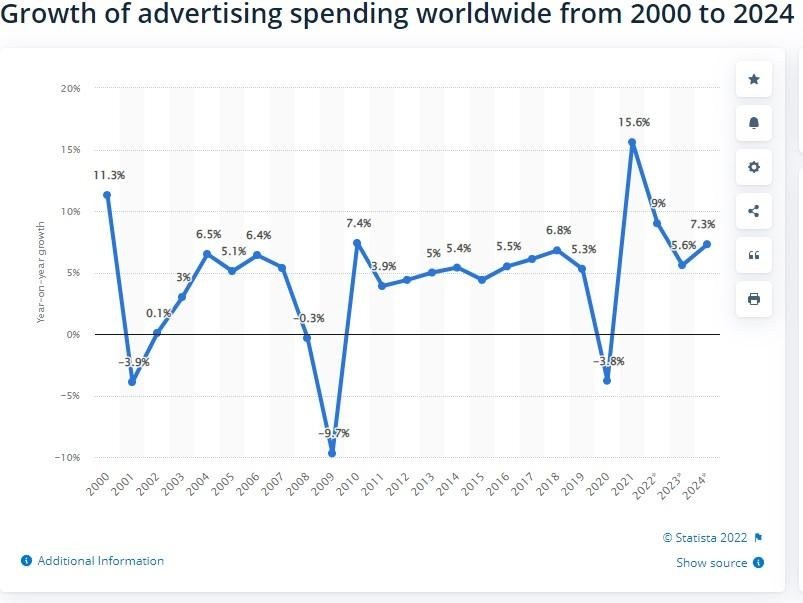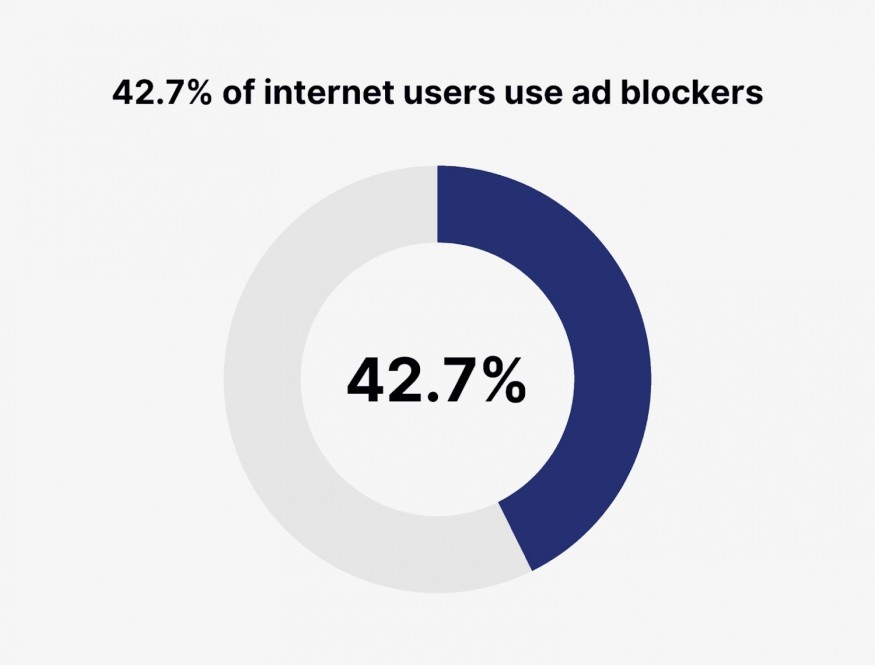Why People Dislike Ads & What You Can Do To Remove Them
Why do so many ads go unnoticed, skipped, or declined? The reason is always the same - brands and advertising agencies sincerely believe that people will be as interested in their product as they are in themselves. And this never happens. People do not care, they basically can't stand ads, especially if they're not creative and too intrusive.
Intrusive advertising for them is always a hindrance that interferes with viewing. A set of messages of the same type, screaming, calling to do what is not close to them. Live a life that is not theirs.
The world of brands and the world of people are not the same. After all, brands are worth millions, and the average salary in Europe is ~ €2,000.
Why Do People Dislike Ads?
Every forum thread, Reddit, whatever, is full of topics like "I hate commercials" and "Why ads make me hate the product or service". The hate movement against adverts is quite common and widespread today, so let's figure out, what are the reasons for such hatred.

Generally, people don't believe what brands tell them. Perhaps this is the main difficulty of the modern advertising industry. After all, trust is an essential element of a healthy, long-term relationship.
Former Unilever marketing director Keith Weed said:
"A brand without trust is just a product, and advertising without trust is just noise."
Consumers distrust advertising and brands by default, and now their skepticism has grown so much that we are experiencing a real crisis of confidence.
Therefore, brands can no longer capture the attention of potential customers with old advertising models. Now it must be earned. To do this, the company needs to be honest, open, and reliable and reflect this position in its advertising.
A recent study found that Americans see an average of 5,000 to 10,000 ads every day. The problem is not only volume - thanks to modern technology, advertising has become more intrusive, ubiquitous, and annoying.
People are bombarded with ads all the time, which makes them tired of it and just start ignoring it. Wherever we go, we are pursued by advertising calling for the purchase of what we have already bought or are not going to buy. A flood of bad publicity filled the screens and news feeds. So it is not surprising that people use software solutions that block adverts and prevent websites from opening new tabs, redirects, etc.
Despite the fact that more and more people stick to adblockers, corporations increase their advertisement spending every year.

If you bombard customers with targeted advertising, it will give a short-term result that can affect the long-term development of the brand. It is better to use the 60:40 formula coined by Les Binet and Peter Field - this should be the ratio of media investment for long-term and short-term brand goals.
Online advertising is to blame for the decline in creativity. The 1960s and 80s were the golden age of advertising. Exactly then the legendary ads such as "Think Small", the slogan "Just do it" and the video with the song "Buy the World a Coke" were brought to light.
Each of them had a big idea, while today such ideas are absurdly rare. This doesn't mean that every single ad or a whole campaign is bad. To recall, I loved the John West "Red Salmon" ad series, they were really good.
Ads grab attention by exploiting negative emotions
According to the studies, people rely on emotions when making decisions. Emotional responses to marketing actually influence people's intent to buy goods/services and inspire people to take action.
Let's look deeper into the emotions and outcoming actions:
● Happiness
When we're happy, we share. Good news travels fast. NY Times studies show that good news and positive content spreads faster on social media than any other type of content.
● Sadness
Sadness leads to empathy and altruism, hence the motivation to act on behalf of others. This is why big and well-known companies/corporations feature sad photos and songs while asking for donations.
● Fear/Surprise
Typically, marketers try not to leverage fear in their advertisements, as it may result in negative feelings about the brand. Surprisingly enough, these studies show that fear makes the brand some sort of a "beam of light" in the darkness, hope at the end of the day.
● Anger
Strong emotions like anger inspire people to share content. This research proves that content eliciting anger leads to virality and increased views.
So yeah, exploiting negative emotions to get the desired outcome is a go-to for marketers.
Commercials Can Slow Down the Browsing Experience
Among the crapload of factors contributing to website performance bottlenecks and snail speed page loading, ads are the most frustrating.
Imagine the scale of the problem, if Google has started penalizing sites that got too excited with interstitial ads, or ads that spam new tabs and trick users into downloading software.
Ad impressions may help publishers earn a pretty penny, but that doesn't change the fact that poorly implemented ads, or poor quality/not tested ads can DO cause website performance issues making visitors never come back. To admit, even if adverts are high quality, tried-and-tested, they will still slow down webpage loading. Especially, if the page is cluttered with diverse forms of ads.
Advertising Quality
Advertising is just one of the factors influencing the desire to buy. Many products sell well despite mediocre and even poor advertising for a number of reasons: they're being sold in the shop next to your house, they are inexpensive, cute, and maybe even good quality.
Despite the fact that there are cases when adverts really made people hate the brand/product/service, it's almost impossible to harm through advertising. Any kind of trite on-air mention is unlikely to harm the brand, but it won't do any good either. People will see the message and remember it reluctantly and not for long, perhaps for a few seconds. These few seconds are expensive, and they will get more expensive over time.
The effect of great advertising can be overwhelming. A brand can become a new cultural phenomenon, an occasion that influences the behavior of an entire generation.
A Lot of People Use AdLock or Other Tools to Block Them
According to Hootsuite research, almost 43% of Internet users worldwide use ad blockers. The use of adblockers is more prevalent among men than women across every age group. Ad blockers are most popular among men aged 16-24, 49.2% compared to 43.2% of women.
For both male and female users, ad blockers are more popular among those under the age of 35.
The most commonly reported reasons for using ad blockers include:
● Excessive amounts of commercials - 22.3%
● Irrelevance - 22.3%
● Intrusion factor - 19.9%

Ads are more than just annoying and distracting - they can pose a threat to cybersecurity.
Attackers often develop advertising messages that hide malicious software. Through advertising partner networks, they can go straight to popular and trusted sites. Sometimes, for a virus to infiltrate, you don't even need to click the pop-up window.
Blocking such ads eliminates many potential problems.
Getting rid of trash and annoying windows is the main purpose of adblockers. It's much more pleasant to look at clean sites and easy-to-read pages. Ad blockers deserve attention just because of their ability to clean up the webpage from visual garbage, annoying pop-ups, callback windows, etc.
Of course, it's a personal decision to use/not use adblocker, but we suggest you get one. For the sake of security and clean Internet.
Subscribe to Latin Post!
Sign up for our free newsletter for the Latest coverage!
© 2025 Latin Post. All rights reserved. Do not reproduce without permission.














